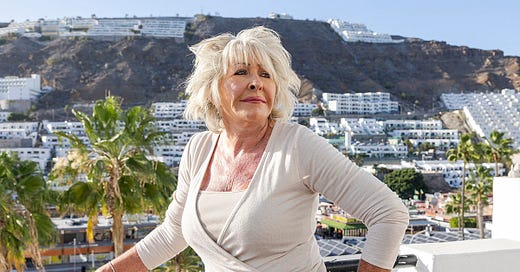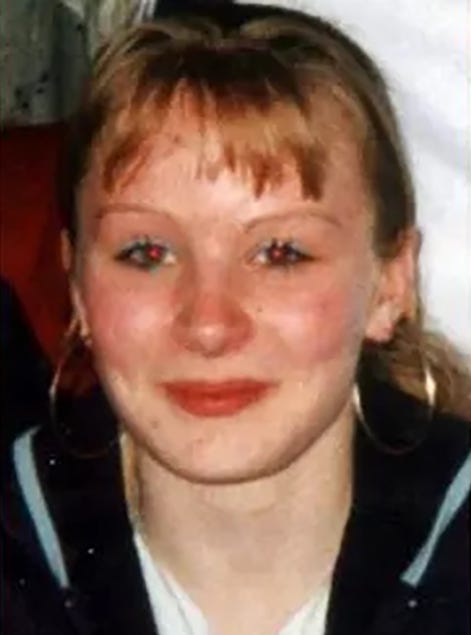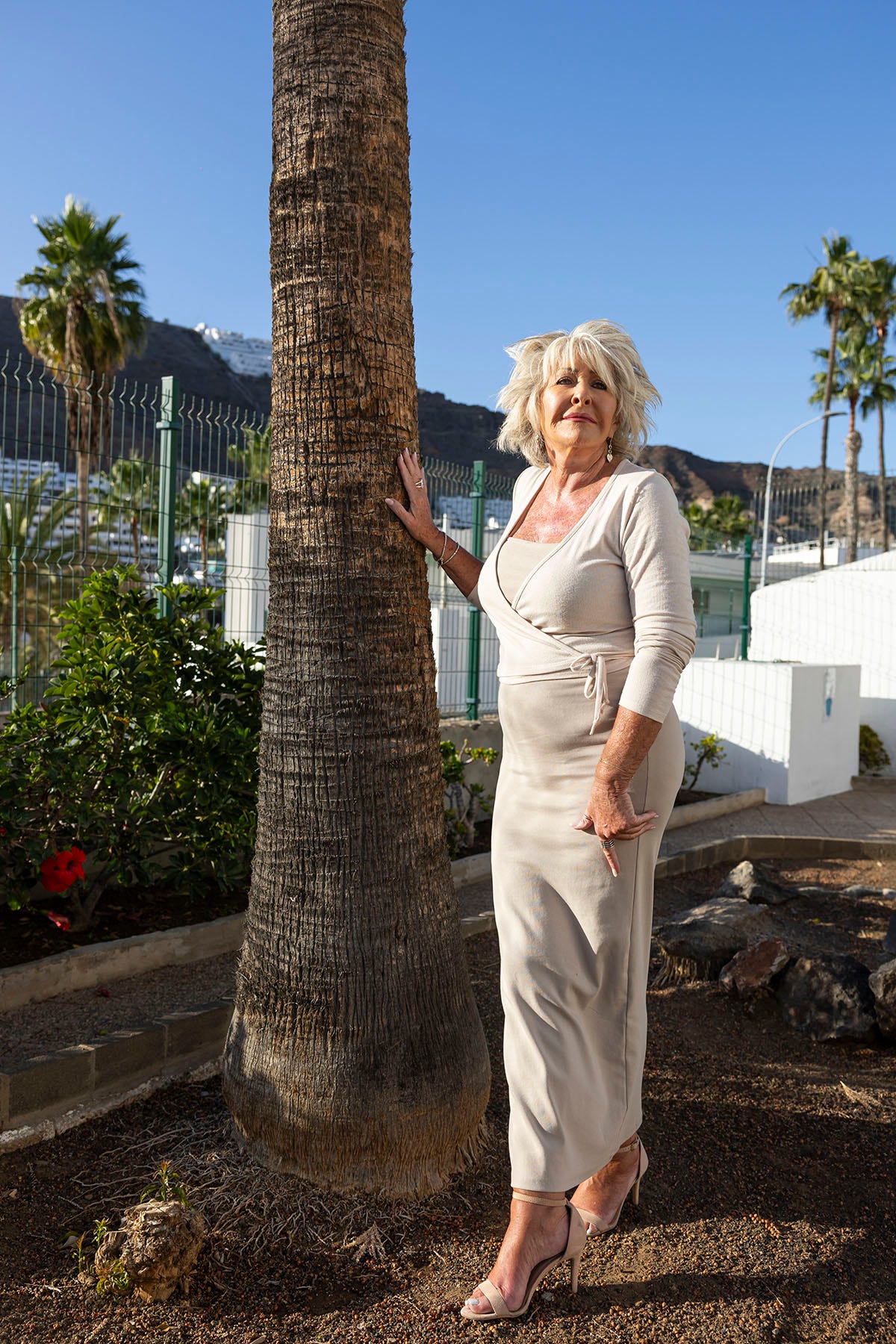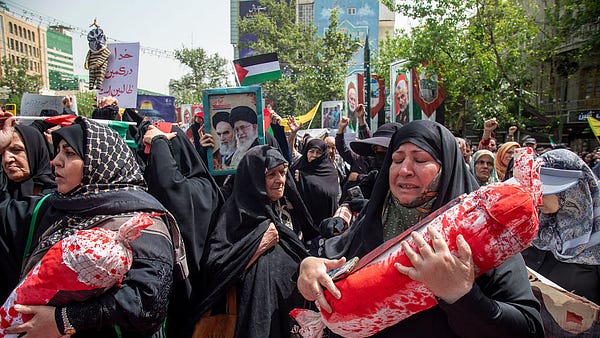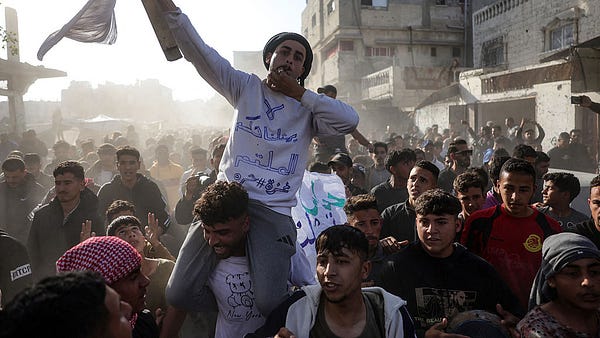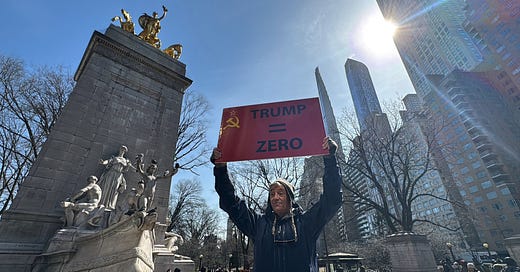
The Free Press

Last month, Elon Musk wrote a series of posts on X about a British scandal stretching back two decades. Gangs of men—almost all Muslim men of Pakistani ancestry—groomed and raped hundreds, and possibly thousands, of British girls, starting from the early 2000s. Social workers were cowed into silence, fearful of being called “racist.” Local police ignored, excused and, in some cases, reportedly abetted pedophile rapists across as many as 50 cities. And senior police and Home Office officials deliberately avoided action in the name of maintaining what they called “community relations.”
Most Americans heard about this case for the first time after Musk started tweeting. Soon after, our own piece on the horror, “The Biggest Peacetime Crime—and Cover-up—in British History,” went viral.
But one woman has been sounding the alarm for 22 years. Maggie Oliver was a police constable in Manchester, where she was the first to uncover the grooming gangs scandal. She doggedly pursued hundreds of cases, and tried to persuade victims to testify against their abusers. But she was repeatedly thwarted by authorities who didn’t want to rock the boat. Eventually, she resigned in protest.
Today she tells the story of her decades-long fight for justice. —The Editors.
Over the past few weeks, politicians, journalists, and commentators have expressed outrage that gangs of mostly Pakistani Muslim men have been raping British girls for years—and that many have not been punished. Many in these institutions have had every opportunity to help shut down this abuse over the last two decades, but they’re only speaking out now because it’s safe to jump on the bandwagon.
To those who have finally found a conscience, I ask: Where were you 20, or even 10, years ago?
Because when I tried to tell the world about this scandal, no one wanted to listen.
It all started with Victoria Agoglia. Born to a single mother, Victoria was only 8 years old when she was first placed in foster care, losing her mom soon afterward to cancer. After that, she grew up in a state-run care facility in Manchester, England. In 2001, after she turned 13, a man in his 20s started turning up at the care home and giving her hard drugs. Staff thought he was her pimp and dealer, and reported him to the police. But incredibly, the police never investigated him.
By 2003, Victoria had gone missing hundreds of times. She repeatedly returned to the care facility upset, disheveled, and drunk. She also told the staff that she had been threatened, assaulted, sexually abused, and raped by multiple men. But when staff also learned that she was being injected with heroin by an older man, no one thought to tell the police. Perhaps they assumed no one would lift a finger to help.
In September 2003, a young man picked Victoria up at the care home and took her to the apartment of 50-year-old Mohammed Yaqoob. That’s where Yaqoob twice injected her with heroin—leading her to overdose. After two days in a coma, she died at just 15 years old.
Victoria left behind a scribbled note, later given to police, which read:
I drank, smoked weed, took pills, had blown coke, had heroin—just for what? All you do is get a laugh out of it but it can also kill you. I got the rest of my life ahead of me. I am only 13. I have slept with people older than me, half of them I don’t even know there [sic] names. I am a slag and that is nothing to be proud of.
I had been a police constable for seven years in Manchester when I learned about Victoria’s tragic story. My boss, Detective Chief Inspector (DCI) Phil Owen, suspected she was not alone. He believed that a sophisticated network of rapists were grooming and abusing girls like Victoria all over the city.
He put me on the case to investigate.
I remember him cautioning me: “I should tell you, Maggie, that all these men are believed to be of Asian origin.”
I didn’t see why that mattered. When I was sworn in as a police officer in 1997, I recited, as all constables do, the Oath of Attestation, promising to fulfill my duties with “fairness, integrity, diligence, and impartiality.” In other words, I promised to treat all suspects the same, regardless of their race, class, or religion. It’s a promise I’ve stuck to ever since. But I could tell, at this moment, that these issues could affect the course of justice.
Because I had joined the police in my early 40s, when I was a wife and mother of four, I had a knack for what I call the “people cases”: runaway children, victims of rape and domestic abuse, anything that required a soft touch. The initial “scoping exercise” into the pedophile networks Victoria Agoglia had fallen prey to was called Operation Augusta. And it took me into an evil underworld that shocks me to this day.
There were three of us on the team as well as a detective inspector who was leading the day-to-day investigations. Within weeks, social workers helped us identify a group of about 100 abusers who were potentially raping dozens of children on a daily basis.
The first victim I met was only 18, barely an adult. Olivia* lived with her baby in a small apartment in Manchester. Her social worker put us in touch, and she agreed to identify the places around the city where she had been abused. As we drove toward Whitworth Park, along “the Curry Mile,” where Asian restaurants abound, we passed a parked black SUV. A Pakistani man was at the wheel. When Olivia saw him, she slid down in her seat and covered her eyes.
“What happened there?” I said.
“That fella. . . the one who got out of that big car. . . . Did you see him?”
“Yes,” I said. “Why?”
“He’s one of ’em, one of ’em who’s been abusing us. I’d recognize him anywhere.”
I kept driving until we passed, then pulled over to record the license plate details.
Back at the station, I ran a check on the plate. Seconds later, I got a call from a member of our internal investigations team.
“Can I ask why you’ve just run a PNC [Police National Computer] on that registration?” a male officer said.
I explained that I’d come across the registration plate on my ride-around with an abuse victim.
“Right, well, this is to let you know that we have this person under surveillance,” he said. “He’s an active police officer, so let us deal with him, okay?”
I was shocked but, as a relatively junior officer, I trusted that the police were investigating this suspected pedophile at the very highest level. Naively, I did what I was told, and left it to my senior colleagues. Years later, I found out the entire scandal, which went way beyond Olivia and Victoria, had been ignored.
But back then, I kept pursuing the case, thinking everyone wanted the same thing I did: justice.
Social workers, who knew the victims well, told me the scale of the crimes, and how the gangs operated in Manchester. Almost always, the girls knew their abusers. They were men who worked as taxi drivers and at Asian restaurants, people the girls met around the community. At least one, we suspected, was a police officer. These men would park outside care facilities and wait for the girls to return from school, then persuade them to come to their homes or remote places in the countryside where they were forced to drink bottles of alcohol and take drugs. At least 26 girls were raped vaginally, anally, and orally, passed around between gangs of up to 20 men at a time. Sometimes the abusers would give the girls £10 for their troubles; other times they were forced to submit by knifepoint or gunpoint. One girl was told she would be “burned alive” if she said anything.
By the spring of 2004, we had a list of just under 100 suspects, most of whom were Muslim men of Pakistani ancestry. And that was in Manchester alone.
Through our network, we started to learn this was happening nationwide. We spoke to forces in Liverpool and West Yorkshire, and both reported the same phenomenon: networks of predominantly Muslim men of Pakistani descent who were grooming and raping underage white girls.
I discovered the gangs were in cahoots. Men trafficked girls to other towns where they knew other abusers. But for some reason, the police in these districts had also been slow to respond.
Clearly, Operation Augusta had uncovered the tip of the iceberg. The assistant chief constable of Greater Manchester Police agreed to escalate our investigation to a national level. All the information we had was entered into a special database.
Around the same time, I had to take several months off work. My husband, Norman—the love of my life and the wonderful father to our four kids—was diagnosed with stage 4 bowel cancer at just 46 years old. I nursed him at his bedside until he passed away in July 2005. By the time I returned to work the following September, I was heartbroken and exhausted, but ready to dive back into the work I loved so much.
As soon as I returned, I asked a senior colleague for an update on Operation Augusta. “Oh yeah,” he said offhandedly. “They’ve warned a couple of lads under the Child Abduction Act.”
In other words, a few suspects got a slap on the wrist, but no one was charged.
“What?” I said, shocked. “You can’t be serious! Is that all? What about all the information we gathered? What about all the offenders we identified? What about those girls being abused on a daily basis?”
He shrugged.
I felt like someone had ripped my heart out.
I asked other senior officers, but they had similar reactions, saying there was not enough evidence to move forward.
DCI Owen, who had originally put me on the case, was no longer in charge of the investigation. And it seemed that the new senior leadership team at Greater Manchester Police had other priorities.
Whatever the rationale for shutting down the operation, I was sure of one thing: It wasn’t because of a lack of evidence.
We had hundreds of pages of reports from social workers, sexual health clinics, and care home staff. We had precise locations of abuse, car registration plates, names, addresses, and testimony from witnesses with corroborating accounts. And yet not one of the 97 suspects we had gathered evidence against was charged with rape, and not one of the 26 young victims would see justice. It was as if all my life’s work and all these children’s lives meant nothing at all. Meanwhile, the abusers were still roaming free, able to target more children.
I didn’t know what to do. The special database had been completely shut down, and there was no way to access anything we’d recorded. I didn’t have a single piece of paper to prove anything I’d seen. Who was I but a low-ranking officer who had been out of the loop for seven months? And I was completely alone, not only a single parent, but the only police officer in Britain who seemed to care about the fate of these vulnerable children.
I was moved on to other cases. But Operation Augusta never left my mind.
Knowing they could get away with it, the gangs preyed on even more young girls. Over the next five years, dozens and perhaps hundreds were abused in the Manchester area alone. And once again, just a handful of men were arrested.
Then in 2010, a police officer in my district stumbled across a major clue: an aborted fetus, stored in a freezer where evidence specimens were kept in the police precinct.
Once again, I was brought on to the case. Detective Chief Superintendent Sam Haworth told me that the fetus belonged to Ruby, and that she had just turned 13 in 2009 when she was raped and impregnated by a married Pakistani father of three. Ruby had gone to a sexual health clinic for an abortion, and a staffer there had called the police. When the cops came, they took the aborted fetus away as evidence, but did nothing with it. They put it in a freezer for about a year until it was found.
I was horrified. We had let the biggest piece of DNA evidence languish in a storage unit while a dangerous predator—and hundreds like him—was on the loose. I was deeply ashamed of my colleagues’ incompetence and indifference.
But still, I had hope. This could be the key to bringing down the whole criminal enterprise.
Getting Ruby’s family on our side wouldn’t be easy. Her older sister, Amber, had also been abused but instead of treating her as a victim, the police falsely accused the 15-year-old of being a “madam”—pimping out other children to rape gangs. The police had singled out Amber as having introduced other children to the abusers. But anyone who understands how grooming gangs operate knows that pedophiles often manipulate their victims into bringing their friends along. Amber had also met her abuser through another child.
At one point, in March 2009, the police had locked Amber in a cell for seven hours on suspicion of “procuring a child into prostitution.” She was never charged, and the authorities later said her arrest should not have happened, but it didn’t matter. Officers had completely alienated Amber and her family.
This was sadly typical. Senior police officers and social workers frequently dismissed the girls as “child prostitutes”—when no such thing exists. This is true even though some girls referred to their rapists as their “boyfriends,” and even felt a misplaced sense of loyalty toward their abusers. That loyalty stemmed from naivete and a tragic ignorance of what real love and healthy relationships look like. What they needed was someone to tell them they were being violated, and that they were in no way to blame.
I remember one senior colleague telling me that, really, the victims would “never contribute to society” anyway and, in his opinion, would have been better off being “drowned at birth.”
I was disgusted that someone with so much influence could think of the girls in the same way their abusers did: worthless.
That’s probably why Haworth told me: “If anyone can gain the trust of Ruby’s family, we know it’s you.”
He told me that this time I would have the full backing of the force, and he put it in writing.
I had to say yes. And Operation Span began.
It was months before I convinced Amber to speak to me. By then, she was 18 and a new mother. She had broken away from the grooming gangs and was living in a shelter for homeless families. When I first went to visit her there, I smelled the unmistakable stench of urine.
Amber lived on the top floor, and I remember her letting me into her room, which was cramped and bare, but her 3-month-old son looked clean and healthy. There were toys and baby goods scattered about the place and I could see he was well looked after.
“Can I have a hold?” I asked.
Amber eyed me suspiciously but then handed me the baby.
“He’s absolutely beautiful,” I said. “And it’s quite clear to me that you’re doing a fantastic job.”
She immediately relaxed, breaking into a smile. Yes, I was a police officer. But she knew at that moment I wasn’t there to judge her.
From then on, I visited Amber on a near daily basis. After many hours of conversation and getting to know one another, she agreed to be interviewed formally as a victim and a witness.
During one of our many taped recordings, I had a breakthrough: Amber told me that the first time she was raped was at a Pakistani restaurant, at age 15, while another 13-year-old girl was raped by another man in an upstairs room. She told me how the men made them drink whole bottles of vodka before assaulting them. She told me about the dozens of men she knew only by their street names—Taz, Tariq, Pino, Saj, Billy, Daddy—who called them up and took them to local towns where she was introduced to yet more men who used her for sex. She told me about a man, known as “Google,” who threatened her at gunpoint if she didn’t give in.
It was trickier to gain the trust of Amber’s sister, Ruby, who had been diagnosed with special educational needs. She initially didn’t want to cooperate, adamant that her abusers were her “friends” and the man who raped and impregnated her was her “boyfriend.” But eventually Amber managed to convince her to help.
Ruby told me about being raped from age 12 to 14 by six men. She spoke of a man who picked her up from school and took her to a house where she was “passed around like a ball” for sex, while 10 men sat around in a circle. She said she had seen “a list on the back of the door” with the names of men who would check a box after raping her; later they were charged for the experience.
I had so much evidence. So did my fellow officers. I was convinced there were numerous abusers we could put away for life. But I started to worry that the police force and the prosecutors were sidelining some key victims of Operation Span, and that they were failing to arrest and charge dozens of abusers.
In August 2011, I shared these concerns with my boss.
The Detective Chief Inspector heard my warnings, but tried to reason with me.
“Look, Maggie, you’ve not said anything I don’t agree with,” she told me. “But the reality is that you’re just a constable. In the police, senior officers make the decisions and as a DC, you do as you’re told, simple as that. You carry out orders—you know that—and if you can’t do that, maybe you’re in the wrong job.”
But I didn’t give up. In October, I tried voicing my concerns to the newly appointed head of the Public Protection Unit. The Detective Chief Superintendent assured me she took my concerns seriously. But after our meeting, she didn’t follow up.
A few weeks later, I went higher still, contacting the head of Greater Manchester Police, Chief Constable Peter Fahy. I outlined my concerns and requested a meeting. He kicked this down the chain of command. Eventually, I got 30 minutes with another Detective Chief Superintendent, the head of the Serious Crime unit.
He told me policy decisions were made by senior officers whether I liked it or not, and that I should be “very careful what I chose to do with the information I held.”
Later, he followed up by email with a similar thinly veiled threat:
You raised an issue within our meeting in a tone that suggested that if you were not happy with the outcome of our discussion that you would have to consider your position and what you did with your information. This gives me cause for concern and I want to remind you of your responsibilities as a police officer who comes into possession of information during the course of their duties and what they can use that information for.
After that, I submitted an official grievance to Greater Manchester Police, saying the force was guilty of “knowingly failing in their duty to properly investigate the horrendous crimes of child sexual exploitation. As a result, we are allowing offenders to escape justice and failing to protect the most vulnerable in our society.”
I made clear in my grievance that I was seeking legal advice in order to speak publicly about what was going on. And I wrote that I had every reason to believe my precinct was attempting to conceal the truth and silence me personally.
The stress of everything became so much that by March 2012, I started experiencing regular dizzy spells. One afternoon, while standing at the station’s photocopier, I blacked out and woke up on the floor looking up at a circle of concerned faces. A colleague drove me to my doctor, who signed me off work for a month with severe work-related stress.
I began to wonder: Am I the problem? Why could no one else see what I did? Was I going mad? But then, in May 2012, I received the findings of my grievance complaint, and I stopped questioning myself. Because it was a pack of lies in black and white—and I knew it as soon as I saw it.
The report from Greater Manchester Police stated that Operation Span was successful, and that I was more concerned about the welfare of Amber and Ruby than the investigation at large. It even had the gall to claim I was overemotional about the case, and that Amber, our key witness, was unreliable.
That same month the trial happened. I didn’t attend. Prerecorded testimony from Ruby and two other girls was presented against the abusers in court—including the man who had raped Ruby—even though we had evidence against dozens more. And Amber was dropped from the trial completely.
In the end, only nine men out of eleven were convicted.
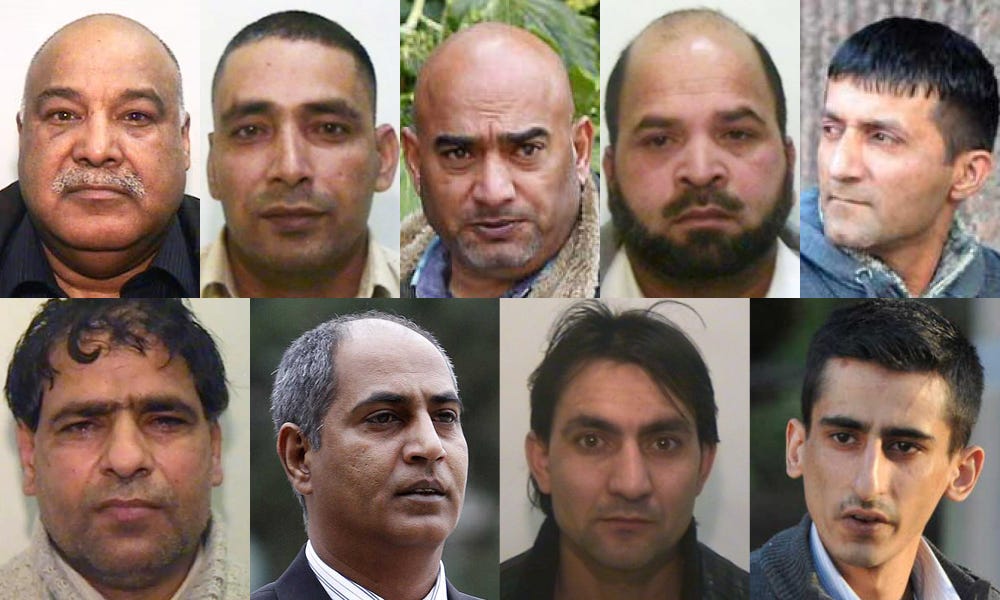
Soon after came the sentencing, which handed out prison terms ranging from four to 19 years. Ruby’s rapist only got eight years after he was charged with the lesser offense of “conspiracy to engage in sexual activity with a child,” even though he had fathered a baby with her. I followed the coverage on TV, and when the sentences were announced I sat alone in my living room and cried in disbelief. And I listened, shocked, as Assistant Chief Constable Steve Heywood—the very officer who had been in charge of protecting child safety in Manchester in 2004 when Operation Augusta was shut down—told TV crews and reporters that this was “a fantastic result for British justice.”
What came next didn’t surprise me. Every one of the men served half sentences, as is common in the UK to keep prison numbers down. Four of the convicted child abusers were given millions of pounds of taxpayer money to fight their deportation back to Pakistan. And all but two of them were back on the streets by 2017.
I remember Ruby calling me, distraught and panic-stricken, after she bumped into the man who got her pregnant in a local shop just four years after his conviction. No one had even bothered to warn her that he’d been released from prison.
Even Mohammed Yaqoob—the man who had injected Victoria Agoglia with a fatal dose of heroin in 2003—had served a short sentence for drug offenses after being cleared of manslaughter years before Operation Span. He, too, was back on the streets.
Operation Span was a symbolic victory—good enough for the British government and the Manchester Police, allowing them to pat themselves on the backs and point to “results.” But it wasn’t good enough for me.
And it wasn’t good enough for the victims.
I couldn’t let this rest. I had to quit my job, and speak out.
In October 2012, I resigned from the job I had loved for 15 years. I was 57 years old and no longer had an income. Thank God my four kids were grown up by then. But I could no longer pay the mortgage on my home, so I had to sell it and move into an apartment that I shared with another renter. I completely downsized.
In the meantime, I started plotting how I would tell the world about what I knew.
One month after I quit my job, I emailed the BBC, hoping to find a reporter who would tell my story. Soon after, a curious producer got in touch. He was stunned by what I told him, and connected me with the people behind the BBC’s flagship radio program, File on 4. The producer, Sally Chesworth, was amazing; she believed my story and even got Amber, Ruby, and their mother, Lorna, to talk.
But shortly before the program aired, I began to worry. The whole country would be listening, including my former colleagues. Would they think me a traitor to the force? Would I lose friends? And above all, one question constantly played through my mind: What if I go to prison for speaking out? My kids had already lost one parent. Would they lose me too?
But I gathered them together and told them: “I couldn’t live with myself if I sat by and said nothing. There are some things in life that are so important that we just have to stand up for them, whatever the risks, and this is one of those things. It’s just too important not to.”
“Well, in that case, you do the right thing and we’ll back you,” they told me.
As I looked at the courageous young men and women my kids had grown up to be, I have never been more proud as a parent. Their courage gave me the strength I needed to go on. I only wished Norman had been there to see it.
Finally, on March 31, 2013, it happened. My story came out. I was on a backpacking tour of India at the time. I decided it was safest to be out of the country, but I could listen from afar. What I heard made me feel sad, relieved, proud, and outraged.
Listening to Ruby, Amber, and other victims talk about their ordeal made me cry all over again. Hearing my own voice was surreal and unnerving. And then I was shocked to hear the words of Chief Constable Peter Fahy, the head of the Greater Manchester Police. He said some of the victims were not credible witnesses, because they had “consented” to sex with their abusers.
A few days later, I heard Fahy on another BBC Radio program saying I’d become too emotionally involved in the case, probably because I had suffered the deaths of my husband and later, my granddaughter, who passed away at the age of 2 from a rare genetic disorder. How could he say that caring about these young girls who had been exploited and abused and abandoned was a flaw?
By 2014, Fahy admitted that “mistakes” had been made due to a “mindset” among officers and prosecutors “that victims in these sorts of cases had been unreliable.”
But that, too, wasn’t enough for me. After I blew the whistle 12 years ago, I have kept on sharing my story. I’ve done countless interviews, and continue to do appearances and talks. A documentary based on my story came out in 2017, and I have written a book, Survivors: One Brave Detective’s Battle to Expose the Rochdale Child Abuse Scandal. In 2019, I established The Maggie Oliver Foundation to empower victims of childhood sexual abuse and exploitation, including the hundreds of victims of grooming gangs.
I’m still stunned by how far the corruption went. In Rotherham, which is just an hour’s drive from Manchester, there were reports that even town councillors and police officers had abused girls. And yet, the authorities have never admitted to the scale of their colossal cock-up. I’ve heard the occasional mealymouthed apology, but what actually needs to happen is complete reform. The police force needs to be ripped from its roots, examined from top to bottom, and forced to grow in a new and healthier direction, exposed to sunlight and transparency.
In 2018 and 2019, an independent review sparked by the documentary about my story revealed some of the reasons why Operation Augusta—and the database connecting all these crimes across the UK—had been shut down. The main reason, it stated, was largely due to disorganization and a lack of resources. It also found that there was “no central responsibility for child sexual exploitation” and this had caused “dispute and conflict between three divisional commanders” about who was in charge.
In other words, everyone had passed the buck.
But there was more to it than that.
Throughout the report, it is made clear that senior officers were concerned about “sensitive community issues” in dealing with this case. They acknowledged that it “was sensitive due to the involvement of Asian men.” There were concerns about “the incitement of racial hatred” if minority men were prosecuted en masse for such unspeakable crimes. Police also frequently referred to the victims as “child prostitutes” or in one case, a “child sex worker.”
My conclusion: Police were more concerned about protecting a band of pedophiles than helping vulnerable young girls.
This story is also damning for our new prime minister, Keir Starmer, who was elected last year. He was the national director of public prosecutions between 2008 and 2013, when most of these pedophiles got away with their crimes. Now, as the story is once again coming to light on the international stage, Starmer has the audacity to accuse his critics of amplifying “the far right” and “spreading lies and misinformation.”
But the story of Britain’s grooming gangs is not a political one. These men got away with their evil deeds over decades when different parties were in power. Both the Conservative and Labour parties looked the other way while this heinous crime and cover-up was happening right under their noses.
Last month, I was amazed when Elon Musk, one of the most powerful men in the world, suddenly took an interest in this story. I also felt vindicated. What happened in my hometown, and in other towns in the UK, all those years ago was so shocking and horrible it is now making waves across the world.
It’s a shame it’s taken a South African–born billionaire living in America to spread the word about this very British scandal. Of course, the UK government is hoping it will all fade away—even as the rape gangs are still operating to this day and the overwhelming majority of abusers have never been charged.
But now, there’s no hiding from the truth. And I will never stop speaking out until I know that every single one of these men is behind bars.
*All names of living victims have been changed.
—As told to Madeleine Kearns


